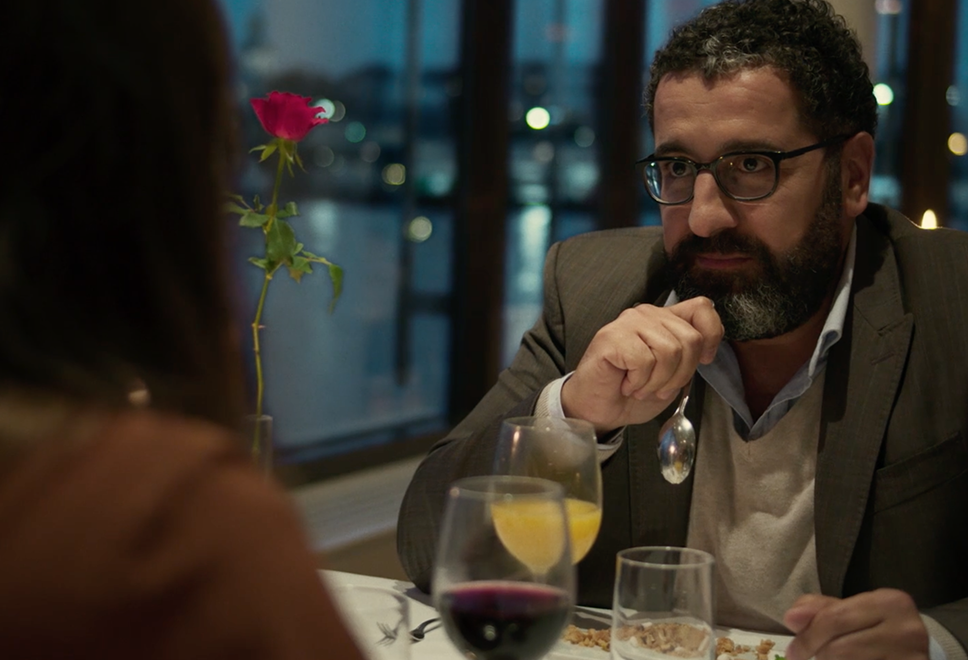“The Intimate Touch” is an independent short written and directed by Ariel McMillion and Michael Støen. At 19 minutes, it includes keen insights and hard conversations, along with profound acting from its leads. At its core the film is about a woman of moderate faith, Ingrid (Anna Harling) and a devout Muslim man, Adnan (Isa Aouifia). But in so many ways it is about more than that. It broaches hard questions and topics, deals with racism and patriarchy, and, like the best films do, offers the needed hand of empathy.
The film’s cinematography is excellent. Along with bright and crisp photography, Cinematographer Sara Svärdsén makes an interesting choice to shoot the film’s opening—dealing with a meeting between office workers—with musical score but no voices. It’s all the more interesting as we see Ingrid try to shake Adnan’s hand, which he rebukes. Their ensuing conversation, as he tries to explain why devout Muslim’s do not shake the hands of the opposite sex (along with Anna’s confusion and anger) is shown only through facial expressions and hand gestures. It sets up the emotion specifically, as well as the film’s aim in general.
The crux of “The Intimate Touch” revolves around a dinner between Adnan and Ingrid at a romantic restaurant. The dinner was supposed to be between three people, but one, who got a promotion, does not join. Is this a date? Is it not a date? Adnan, stolid in his beliefs, outlines his position, while Ingrid, who does not share his beliefs, tries to defend hers. And while anger and emotions rise, McMillion and Støen ensure their film’s success by grounding it in empathy, no easy task given the film’s subject matter.
There are several high points of “The Intimate Touch” that sell the film in equal measure. The acting is best when Aouifia and Harling are deep in philosophy; but it also excels with intimate moments that hint at deeper meaning. Ingrid speaks about how patriarchy is responsible for much violence in society, and comes alongside Adnan by questioning why all Muslims are blamed for violence induced by a single Muslim, while White perpetrators are solely blamed for their actions.

Adnan adds some points, attempting to deconstruct bigotry towards Muslims while defending his position. But things spiral somewhat out of control when the duo admit an attraction for each other; but to Adnan that attraction is ‘impure’ as it has not been purified by the embrace of marriage. The push-and-pull between love and faith, and culture and emotion, is aptly described by the filmmakers and acted just as well by the film’s leads.
But where “The Intimate Touch” excels is its critique of how belief and reality are hard things to marry. Adnan violates his faith on two occasions and asks God to forgive him as the two touch hands. However, we can say the same for Ingrid. Opening the dinner by speaking out against patriarchal violence and the danger of “boys will be boys” allowances, she (maybe?) later purposefully trips an annoying child running around the restaurant after a perceived insult from Adnan. I don’t believe the film is critiquing hypocrisy here; it is simply commenting on how hard beliefs are to hold onto when life gets in the way.
And I think that is the strength of McMillion and Støen’s film: it doesn’t ask for acceptance or understanding, but makes us question our own desires and pliability. It would perhaps be easy to editorialize, and discuss what parts of the film a viewer may or may not agree with. But that’s besides the film’s point. The film doesn’t ask us to understand, but to feel.
There are some other jewels, such as its subtle soundtrack by Robert Lundgren, and its warming photography which make the film feel like a welcome place. There are some beautiful shots as the movie comes to a close, and the final pieces of dialogue between Adnan and Ingrid are loving, painful, and bittersweet. The ‘intimate touch’ is a well-defined Muslim concept as described by Adnan. But offering Ingrid an umbrella, discussing feelings that may never be realized, I felt maybe this was the intimate touch. It lands as one of the nicest shots in an independent film I’ve seen this year.
All-in-all, “The Intimate Touch” does its job. It’s emotional, insightful, and offers food for thought on a difficult subject. I’d urge anyone who wants to learn more about relationships, culture, and religion—and how hard their coming together can often be—to watch this film. It packs much into its run-time, wraps up well, and makes you think. It’s hard to ask for more than that from a movie that runs 19 minutes.
*Note: “The Intimate Touch” is currently a finalist for ‘Best Narrative Short’ at the Manchester Lift-Off Film Festival. The film is currently doing the festival circuit. Screening updates will appear on the film’s website at www.theintimatetouch.com.
Facebook: facebook.com/cassandrapics
Instagram: @the_intimate_touch